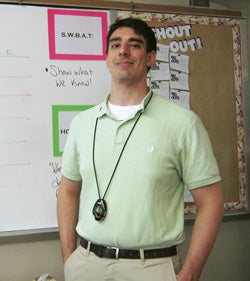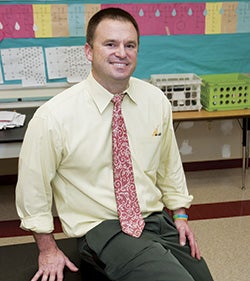
Diane Kern knew she had to do something about the conversations, controversies and frustrations relating to public education she experienced during and after her 14 years as a public school teacher.
Teacher morale has been sinking for several years; high stakes testing of students and corresponding evaluations of teachers without appropriate curriculum development and support have taken a heavy toll, according to the University of Rhode Island alumna and associate professor of education. Battles over what works and what doesn’t are playing out across the country. From heavily financed efforts to expand charter schools to vouchers to a groundswell of support for eliminating comprehensive four-year teacher education programs from the nation’s universities and colleges, public education is quite simply in turmoil.
“I was and still am very upset about what is going on,” said Kern, ’84, ’93 MA, and ’03 Ph.D. “When I saw the call for proposals for the next URI Honors Colloquium, I spent a whole weekend developing a draft.”
She then met with David Byrd, director of URI’s School of Education, who fully endorsed a series of discussions on this topic for the University’s 51st annual fall honors colloquium.
The result is “Great Public Schools, Everyone’s Right? Everyone’s Responsibility?” the newest edition of the popular URI lecture series, which will run Tuesdays this fall at 7:30 p.m. (the series began on September 10 and runs through December 10). All programs are free and open to the public and held in Edwards Hall. The October 15 lecture starts at 6:30 p.m., and there is one lecture on Wednesday, November 20. For a complete listing of all events and sponsors, please visit www.uri.edu/hc.
“Everyone has an opinion about public education, from those on the late-night news shows to those on the sidelines at youth sports,” said Kern, who added that URI’s School of Education and Honors Program are pleased to be offering a dynamic speaking program sure to spark interesting discussion. “I believe it is every child’s right to have access to a great public education, but I think to a great degree, many people feel that as long as their children are educated well, that’s acceptable. In so many ways, we have lost sight of the public, common good in this country.”
Even the graphic developed for the program’s printed and web material depicts a schoolhouse with an eraser rubbing out its very existence.
“We have a broad spectrum of speakers, perspectives and issues that are shaping education, and in the long run, the quality of people’s lives,” Byrd said. “The citizens of Rhode Island are interested in education and how important it is to the state and nation.”
As part of the colloquium, URI honors students will attend all of the lectures and be enrolled in a class entitled “Zombie Ideas in Education,” during which students will discuss key issues and develop solutions based on their research. In addition, several of the colloquium speakers will address the class directly. On November 26 at 2 p.m. Henry Giroux will speak to the class via Skype about his book, Education and the Crisis of Public Values: Challenging the Assault on Teachers, Students, & Public Education.
The colloquium kicked off on Tuesday, September 10 with “Grading Education: Getting Accountability Right,” the keynote lecture and title of the most recent book by Richard Rothstein, research associate of the Economic Policy Institute and senior fellow of the Chief Justice Earl Warren Institute on Law and Social Policy at the University of California, Berkeley, School of Law. Rothstein is also the author of Class and Schools: Using Social, Economic, and Educational Reform to Close the Black-White Achievement Gap; The Way We Were? Myths and Realities of America’s Student Achievement; The Charter School Dust-Up: Examining the Evidence on Enrollment and Achievement; and All Else Equal: Are Public and Private Schools Different?
September featured “The State of Education in Rhode Island,” a conversation with state public education leaders Deborah Gist, Raymond Di Pasquale, and Eva-Marie Mancuso, and Scott MacKay, political analyst for Rhode Island Public Radio, cosponsored by the radio station and moderated by education reporter Elisabeth Harrison; and “The Search for Knowledge,” a talk by Pulitzer Prize-winning author Geraldine Brooks, who discussed her book, Caleb’s Crossing, URI’s common reading selection for the fall, which brings to life the 1665 graduation of the first Native American, Caleb Cheeshahteaumauk, from Harvard College.
A labor of love: URI alumni teaching success stories
 John Holmes ’12
John Holmes ’12
John Holmes’ first year teaching—just last year—was “without qualification the hardest thing I’ve done in my life,” and it was “also the thing of which I’m most proud. When I think of some of the gains I’ve seen in my students, and that I played some part in helping those students achieve those gains, it feels incredible.”
Holmes always saw himself as a person who pushes others to succeed, and for him, that translated into teaching as a profession. The Smithfield, Rhode Island native triple-majored in secondary education, English and French at URI, and is now teaching English and French at Lee High School in Montgomery, Alabama. Though he followed the path of traditional educator training, Holmes leaped into his teaching career as part of the Teach For America (TFA) corps and is entering the second of his two-year commitment to Lee.
Holmes’s affinity for TFA was born of his attraction to teaching in general. “Education is a pathway to social justice. It’s a sad fact that the quality of a child’s education is statistically determined by his zip code, and that there is an obvious and unacceptable achievement gap between students from lower-income families and their more affluent peers. I chose Teach For America because the organization’s goals strongly resonated with my own values and it seemed like a perfect fit,” he said.
Holmes believes that no matter how a teacher comes to be certified, either traditionally or through programs such as TFA, no preparation really readies an educator for most situations they’ll encounter in the classroom. “My education at URI certainly helped demystify the teaching profession. I learned how to write solid lesson plans, handle basic classroom management situations, and plan comprehensive units. But I was less prepared for the full scope of actually being a teacher—communication with parents, documentation and paperwork, extreme management issues, and politics.”
In Alabama, as in most other parts of the country, all eyes are on teacher and administrative accountability as a means to improved student performance. Holmes believes that ongoing feedback and collaboration is the most important thing to maintaining good practice in the classroom—a combination of collaboration on lesson plans and peer observation and feedback. “What I’ve appreciated about Teach For America is that it has offered support throughout the school year in the form of professional development, coaching opportunities, and networking with other teachers in the same content area,” he said.
“I know I’ve had a strong impact on the lives of many students, so the teaching experience thus far has somewhat matched my expectations. But I will say that the job is much more difficult and challenging than I had originally imagined,” Holmes emphasized. Education programs at URI and other institutions would do well to encourage college students to observe as many different types of classrooms in as many different areas as possible, and to take on as much responsibility as possible during practicums and student teaching internships, Holmes observed. And he advises new teachers, “You’re going to make a lot of mistakes. Focus on the positive and take failures as opportunities to reflect and improve.”
Holmes sees a long career ahead of him, not only in teaching, but also with TFA. “I can’t think of anything more rewarding than a career working directly with students and helping them to reach their goals. I’m inspired by the task of challenging my students to consider new ideas and envision futures for themselves beyond what may be dictated by their surroundings.”
In fact, Holmes’ big idea is a world where every child has access to an excellent education so that all children have the opportunity to live their dreams.
 Mike Lobdell ’96, M.A. ’10
Mike Lobdell ’96, M.A. ’10
For Mike Lobdell, teaching was a thoughtful destination that followed a deliberate journey through several career fields. Years of exploring project management, sales, finance, and data management left him unfulfilled. His mind was set on making a difference in people’s lives rather than on accumulation of wealth. “I’d always thought teaching might be a good career option, but it took me several years of soul-searching to finally give it a try,” Lobdell said. And his road to becoming an award-winning teacher was anything but traditional.
In 2001, five years after he’d earned his zoology degree at the University of Rhode Island, a colleague’s invitation led to three seasons of coaching middle school basketball, an experience he says helped him see his potential as an educator. “I realized I have a tremendous amount of patience, that when people are giving me trouble it’s because they are having trouble. And above all, thinking about how people learn has always been very interesting to me,” he said. He also ventured into adult education, giving a course in Internet instruction in North Kingstown, and found himself inspired by the growth he saw in his students. “It was a very real class experience in terms of students having different needs and wanting to learn different things.”
So in early 2004, Lobdell set out on a course toward earning his teaching certification. Without an undergraduate degree in education, he chose to enter the profession through the state’s transcript analysis program.
While a traditional education degree program pairs a student teacher with an experienced teacher in a classroom for a semester-long student-teacher experience, Lobdell thrust himself into a full-time teaching role without the back-up of another teacher in the classroom. He earned his classroom hours first as a daily substitute, and then as a long-term substitute in a self-contained special education classroom at South Kingstown High School for the 2004–05 school year.
“That was very challenging for anyone, let alone a first year teacher,” Lobdell said. “I had to adjust and learn quickly. I was lesson planning and doing the work of a full-time teacher, and things didn’t always go as planned. I had to bring all the resources at my disposal with me—other teachers, parents, students, administrators.” When asked if he regrets not going the more traditional route, he says, “I learned a lot about my potential and about teaching in that position. Sure, I may have taken away some other things from student-teaching versus subbing, but to complete that process, come out at the end of the year and be able to say I put everything into it, and see the growth in those students and some of them graduate, was very rewarding,” he said.
The next year, with certification in hand, Lobdell became a full-time science teacher in the Warwick School District. He came out of the gate running, teaching biology, AP biology, and physical science, co-launching an anti-bullying program that now runs in schools throughout Rhode Island, taking advantage of professional development opportunities at URI and other local schools, and taking on any leadership role to which he felt he had something to offer. In 2011, seven years after launching his teaching career, Lobdell received the prestigious Milken Educator of the Year award, which recognizes early-career teachers for impressive achievements as a teacher and for the promise of what they will accomplish in the future.
For Lobdell, compared to his previous career paths, “teaching is the most difficult job I’ve ever attempted to master. Working with young people brings a different set of challenges from working with adults. The performance of others is linked directly to my performance. And every year brings another set of students that may or may not show the same growth as the previous year, which can be quite jolting to my sense of success as a teacher.”
But like teacher evaluation systems, the challenges of teaching are always changing, and Lobdell says he could never become bored or tired of the profession. “The most important thing is making sure students grow academically, socially and morally. As long as I can show I am facilitating growth in my students’ education, I will continue as a teacher in some way. And as long as teachers are still serving their students, then all these changes and politics will not get in the way.”
—Dave Lavallee and Cindy Sabato
 Home
Home Browse
Browse Close
Close Events
Events Maps
Maps Email
Email Brightspace
Brightspace eCampus
eCampus



